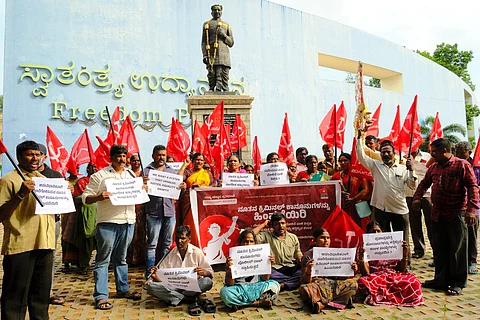

Demanding a rollback of the newly instituted criminal laws, members of the Communist Party of India (Marxist-Leninist) Liberation [CPI(ML)] party held a protest rally at Bengaluru’s Freedom Park on Friday, July 5th. The demonstration, which featured speeches condemning the laws, which came into effect from July 1, urged the Karnataka government to reject the implementation of these “anti-people” laws within the state.
Members of the organisations associated with the CPI(ML) such as the All India Student Association (AISA) and the All India Central Council of Trade Unions (AICCTU), were also present during the protest. They termed the laws as "draconian" and expressed concerns over them jeopardizing the rights of workers and students alike.
The protesters expressed apprehensions about the laws being passed in Parliament in the absence of majority of the opposition. They raised serious doubts about the constitutional validity of these laws and said they refused to accept them. They also believe that the Union government, rather than addressing the colonial legacy of repression, was instead intensifying it, further silencing those who stand against its policies.
Speaking to TNM Sharath B, a lawyer present at the protest said “We are here to protest against the attempts of the Union government to convert India into a police state. The 3 new criminal codes that are in order now give infinite power to the police and keep the citizens at their mercy. The claims of doing away with colonial-British laws are completely bogus; in fact, these laws seem to be beating the British at their own game, they are more draconian and anti-people. They simply show the government's agenda to stifle dissent and push pro-corporate policies without resistance. ” He further emphasised the threat to democratic voices under the increased penalties for sedition and the newly added terrorist act under section 113.
Addressing the crowd, activist Leekha Adavi highlighted instances of increased police brutality after the implementation of the new laws. She cited an FIR filed against a local street vendor in New Delhi under the pretext of disrupting a government official’s proceedings. Adavi also expressed concerns over the excessive force used during the detention of student protesters against incidents related to the NEET exam mishappenings.
Aratrika Dey, a member of the All India Student Association (AISA), emphasized the fears among young Indians about their future under such stringent laws.“The new laws are definitely going to impact the association's movements and pose broader implications for speech and activism especially here in Bengaluru city. Since 2022, protests outside the Freedom Park have been banned, which in itself has shrunk our democratic voices to a large extent. These new laws add another layer of suppression to it.” she said.
The new criminal laws, which came into effect on July 1st, aim to replace the colonial-era Indian Penal Code, Criminal Procedure Code, and the Indian Evidence Act. These laws, known as the Bharatiya Nyaya Sanhita (BNS), the Bharatiya Nagarik Suraksha Sanhita (BNSS), and the Bharatiya Sakshya Bill (BSB), have been criticized for granting excessive powers to the police and for provisions that critics say could be used to suppress dissent and target minorities.